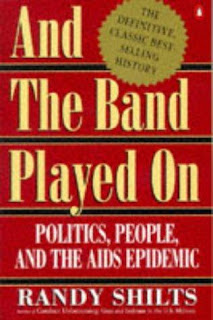Perhaps that's why it took me so many years to pick up Randy Shilts's And the Band Played On, the history of HIV/AIDS in the USA during the late 1970's and early 1980's. Instead of reading about this disaster years after it happened, I watched this disease emerge into the collective consciousness. The prognosis at that time was awful and I purposely avoided the book until advanced treatment gave AIDS sufferers some hope for a decent life. So much has changed in the last 30 years that I thought I could read this at last with detachment. I was wrong. AIDS was and remains a hideous problem and, as Shilts points out in this excellent book, so much of the devastation was avoidable.
Mr. Shilts said he started writing this book after a famous journalist included a joke about the disease in his keynote speech at a professional function. To him, the speaker's callous attitude summed up the unspoken belief that the disease was "someone else's" problem. Because of the "not my problem" attitude, horrendous mistakes were made.
The symptoms first started showing up in gay men living in urban centers and although the mortality rate from the disease was high and its growth rate was exponential (159 reported U. S. cases in 1981; 771 in 1982 and more than 2800 in 1983), there wasn't much about this in the main-stream press during that time, certainly not the way the 1976 Legionnaire's outbreak (34 deaths) was covered or the Toxic Shock Syndrome issue (17 deaths) was reported in 1980. Because it wasn't reported much, the information didn't get out and sick people couldn't get needed help, public health officials couldn't make their voices heard about needed policy changes and research to treat or cure the condition wasn't being funded or done.
The book has its flaws and detractors. Some survivors dispute Mr. Shilt's portrait of Gaetan Dugas, the flight attendant linked to 40 of the first 248 cases. Post-publication research shows AIDS arrived in the U. S. before Mr. Dugas but the author never got this information; he died from AIDS before it was verified. What this book does do is successfully capture the years when the disease emerged and how so many tried to ignore it.
I was one of those young, single women who danced in the early days of the epidemic and while the band continued to play. I was lucky enough to escape both direct infection (some other straight girls were not) and the indirect agony of losing a loved one to the disease. Instead, I counted the deaths of people whose work I admired (including Mr. Shilts) and watched social attitudes boomerang from a careless, free-wheeling acceptance to paranoia and fear. Eventually some tolerance and responsible behavior prevailed over the insanity but not before lives were ruined.
The band still plays and the party goes on but new arrivals approach the dance floor knowing about safer practices and retrovirals. This is good since AIDS now lives all over the globe and in more than 31 million people. Only Providence knows if/when a real cure will be found. When that happens, And The Band Played On will become another historical book about a human tragedy. I would love to see that happen.
If it does, people may read Randy Shilts's book years from now and marvel over his work. They'll shake their heads over early missteps in the AIDS epidemic and cheer the marginalized community that organized itself and responded to problems ignored by the people in power. Somebody, someday will read this disaster account and feel only compassionate detachment. That person will never be me.
























